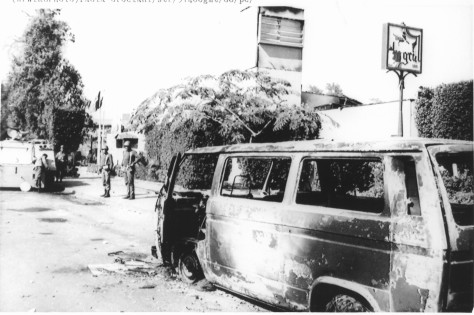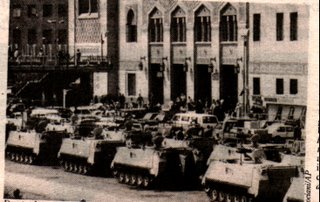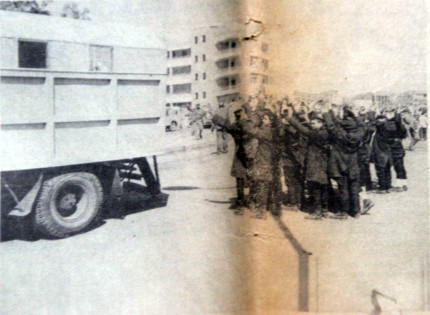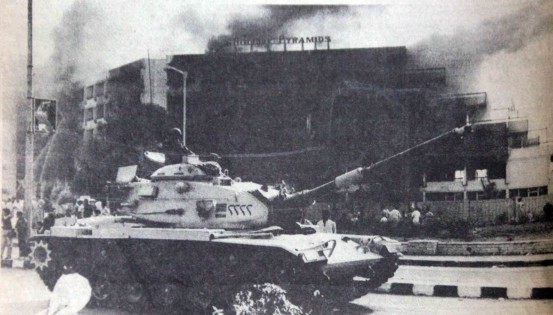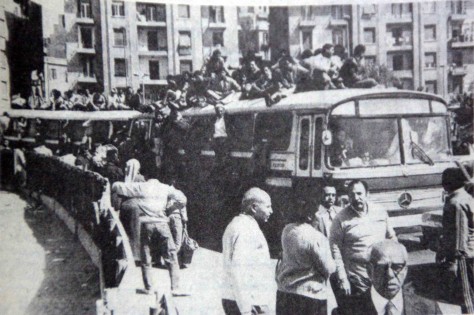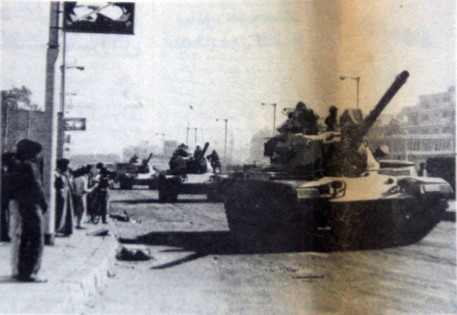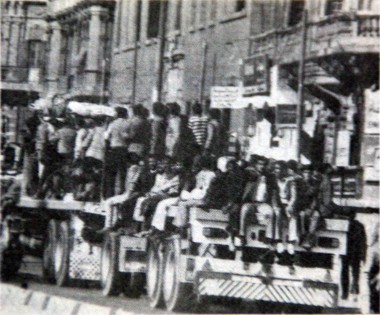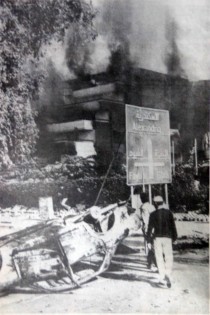Tag: mutiny
The Innocent
Here’s a Egyptian classic film you should try to get hold of its uncensored copy.
I found online, via Torture In Egypt Blog, the uncensored finale of Ahmad Zaki‘s 1986 movie “Al-Bare’e” (The Innocent), where he plays the role of a naive peasant police conscript, brainwashed to torture dissidents in prison by the sadist prison sheriff (played by Mahmoud Abdel Aziz), as “enemies of the nation” or “spies” or whatever.
Our innocent conscript however gets disillusioned when one day a young fellow from his village shows up among a new patch of student detainees sent to the torture factory.. Zaki spontaneously tries to protect the young man (played by Mamdouh Abdel Alim) from the “welcome party” arranged for the detainees in prison, while screaming he knew the detainee and that he could not have been a “traitor” or a bad guy.. Zaki ends up in trouble, while the young detainee dies.
The final part of the movie was censored by the government, though bootlegged copies were always in circulation, depicting Zaki, released from confinement and back on the job, climbs up the tower, spots a new group of detainees being shipped in, so he decides to shoot the sheriff and the soldiers.
The official version of the film, which the government allowed, only showed Zaki screaming “No” and then the screen freezes. The uncensored edition however was shown public only once in 2005 when the Minister of Culture decided to honor Zaki’s memory during the Cairo Film Festival.
Enjoy!
On the 1986 CSF Intifada
I met yesterday retired Police Brigadier-General Mahmoud Qutri, for coffee and chat. Qutri is probably the most vocal among the very few retired senior security officials who are more than happy to expose the corruption inside the Interior Ministry and the systematic torture of citizens in custody.
One of the things I asked Qutri about was the 1986 intifada of the Central Security Forces’ conscripts. I wanted to know his opinion in particular regarding a widely popular conspiracy theory that it was drug dealers in collaboration with elements within the security establishment who were behind instigating the conscripts’ mutiny, as a way to get rid of General Ahmad Rushdi, then the interior minister credited with limited security reforms when he was in office.
Qutri strongly denied these allegations, and also rejected the theory that Islamist militant groups were behind the events, affirming it was a spontaneous uprising by the conscripts, caused by the ill-treatment on the hands of their officers.
“I call them the ‘Interior (Ministry) slaves,'” said Qutri of the CSF conscripts. “They receive the worst treatment among the conscripts. It was even worse before 1986. They used to get paid LE3 a month then. It was common for the soldiers to get beaten up by their officers brutally. In one case I learned of for example, an officer punished one of his conscripts, by stripping him of all of his clothes except for the underwear, covered his full body in molasses, and left him to burn under the sun for a day.
“Rumors spread that the three-year conscription service was to be extended by an additional year… The soldiers exploded. They attacked, killed their officers in the camps. It wasn’t all over the republic. It was mainly in Cairo and Giza. The army had to be called in.”
More interestingly, Qutri said “The army conscripts obeyed the orders and shot at the CSF conscripts. But they also shot several police officers deliberately. In my view there were two reasons: One is army troops hate the police as a whole, and vice versa. Secondly, police officers in specific are hated by the public. Those army conscripts were after all part of the people, and had some brother or cousin mistreated in a police station, so they decided to take revenge while quelling the riots.”

